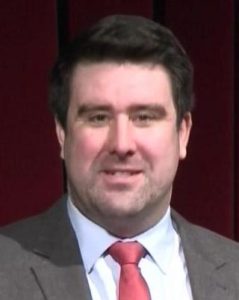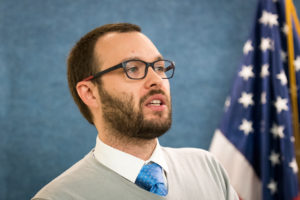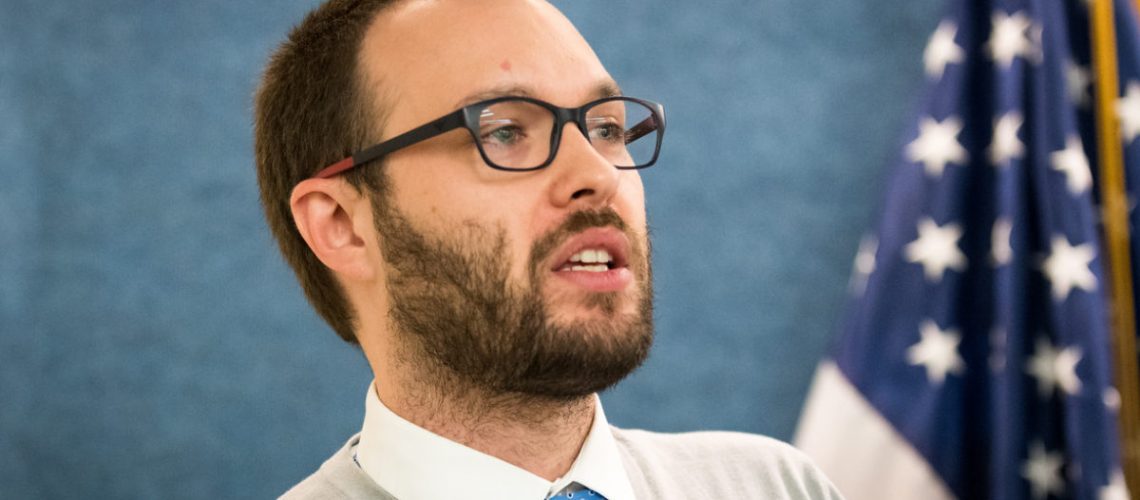Citizens Against Political Assassinations (CAPA) published on April 24 transcripts of the how-to overviews delivered by two Freedom of Information Act (FOIA) experts at CAPA’s “Sunshine Week” conference held at the National Press Club on March 16, 2017 in Washington, DC.
The experts were Nate Jones of the National Security Archive and Adam Marshall of the Reporters Committee for Freedom of the Press. The top of their remarks are excerpted below, with the full transcript available via the JFKcountercoup site edited by CAPA board member William Kelly.
 Jones (shown in a file photo) described the current state of President Kennedy’s assassination records disclosure under the Freedom of Information Act (FOIA) and otherwise. The top of his remarks is excerpted below, with the full transcript available via the JFKcountercoup site edited by CAPA board member William Kelly.
Jones (shown in a file photo) described the current state of President Kennedy’s assassination records disclosure under the Freedom of Information Act (FOIA) and otherwise. The top of his remarks is excerpted below, with the full transcript available via the JFKcountercoup site edited by CAPA board member William Kelly.
Nate Jones: Thanks a lot, thanks for putting this on. It’s great to be here today, my name is Nate Jones from the National Security Archive and despite the official sounding name, the National Security Archive is a non-profit that files thousands of FOIA and mandatory declassification review requests each year, and we fight to get previously classified information declassified and published.
That said, I am not an expert on JFK assassination, the main reason is because the field is already crowded with experts, you here. So generally the National Security Archive focuses other matters, but I’m happy to talk today about perhaps fighting for access to records, not least of which because the JFK records collection act was one of, if not the strongest, laws ever passed for disclosing records.
I have a few points that I’ll go through and hit, and anything else we can talk about it in questions. So, what is needed today, or what we talked about earlier today, the JFK records collection act, is very important. The head of the government office of information service, which is in charge of bureaucrat in charge of collecting classifications government-wide. It’s said on the record that government classifiers joked that they could classify a ham sandwich. The National Security Archive finally won a lawsuit for official CIA volume of Bay of Pigs history that the agency with the department justice lawyers argued to a judge and won, that its release could quote confuse the public, so it could remain secret. In this case we went to congress and congress actually passed the FOIA improvement act that, it is typically said that documents over 25 years can’t use this pre-decisional exception anymore, so we won! But the executive branch didn’t do it for us, just like the JFK Act, we had to go to congress, and congress had to actually pass a law, something that is rare, but these two anti-secrecy matters happened.
Details: Transcript: Nate Jones of the National Security Archive.
Marshall provided a how-to presentation on how to obtain documents under the Freedom of Information Act (FOIA). The top of his remarks is excerpted below, with the full transcript available via the JFKcountercoup site edited by CAPA board member William Kelly.
 Adam Marshall (shown in a photo by Noel St. John): Good afternoon, my name is Adam Marshall, I’m an attorney at the Reporter’s Committee for Freedom of the Press. Among other things, I participate in federal FOIA litigation and state public records litigation. That’s about all I do. For those of you that are unaware that the Reporter’s Committee is a non-profit based here, in Washington D.C., we primarily assist reporters and news organizations and all kinds of legal issues regarding the collection and dissemination of the news. My part in our organization’s responsibilities is, like I said, is getting reported information from the government.
Adam Marshall (shown in a photo by Noel St. John): Good afternoon, my name is Adam Marshall, I’m an attorney at the Reporter’s Committee for Freedom of the Press. Among other things, I participate in federal FOIA litigation and state public records litigation. That’s about all I do. For those of you that are unaware that the Reporter’s Committee is a non-profit based here, in Washington D.C., we primarily assist reporters and news organizations and all kinds of legal issues regarding the collection and dissemination of the news. My part in our organization’s responsibilities is, like I said, is getting reported information from the government.
So I thought what I would tell you about, a little bit, because it is Sunshine Week, is the state of FOIA, which I’m sure you all already know, and also to talk a little bit about the recent amendments to FOIA that were brought in the 2016 updates. Then, finally to look forward a little bit in terms of what needs to be fixed with FOIA, so that we can get access to even more records.
Details: Transcript: Adam Marshall of the Reporter’s Committee for the Freedom of the Press.

